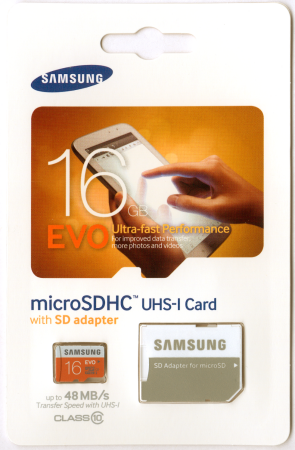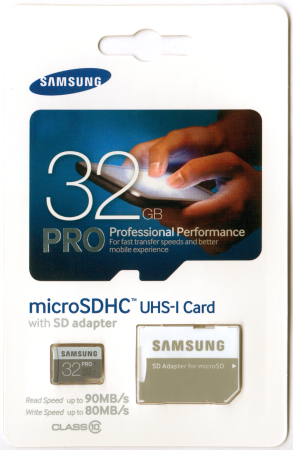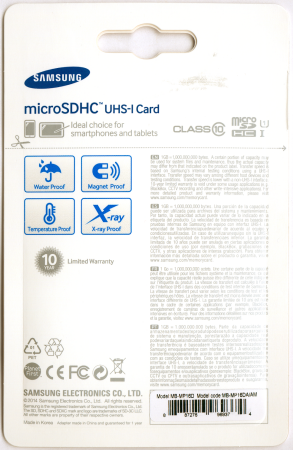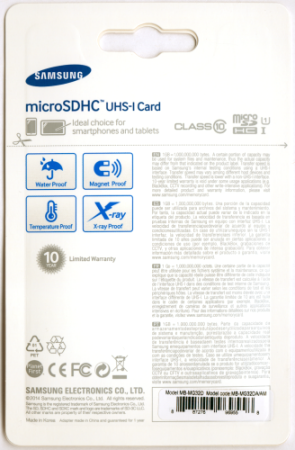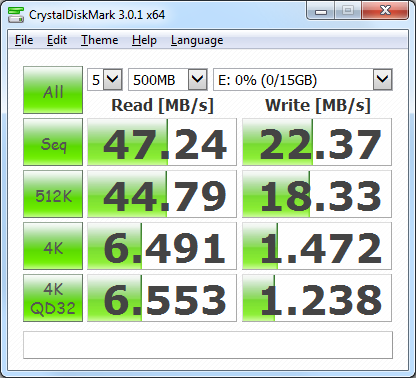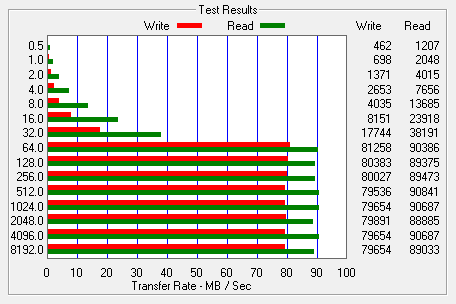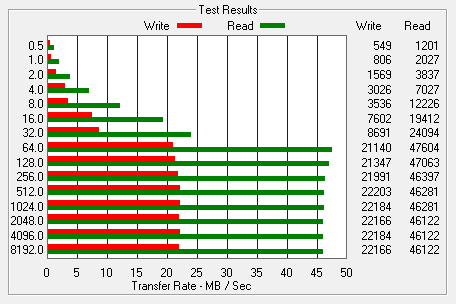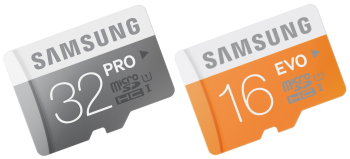

Model: Samsung EVO and PRO microSD Memory Cards
Manufacturer: Samsung Electronics
Provided By: Samsung America
Samsung Electronics has been a leader in the electronics industry for more than 30 years. Since the introduction of their first television in 1970, this Korean company has grown to become one of the world's leading electronics manufacturers, offering everything from tiny semiconductors to large home appliances. Samsung is no stranger to the storage industry either. Along with an assortment of DVD and Blu-ray Disc drives, the company offers both hard drive and flash based storage solutions for the portable and desktop computer markets.
This past spring, Samsung launched its new line of advanced SD and microSD cards. Completely redesigned with bright, color-coded hues, these memory cards are available in PRO, EVO and Standard models for use in many different consumer electronic devices. Where the Standard model offers solid performance for mobile phones and compact digital camera, the EVO is ideal for smart phones and tablets. Boasting Ultra High Speed (UHS-I) Class 10, Grade 1 level performance, the EVO is able to read at speeds as high as 48 MB/s. Samsung's PRO SD and microSD cards offer even greater read and write speeds for use with full HD camcorders and DSLR cameras.
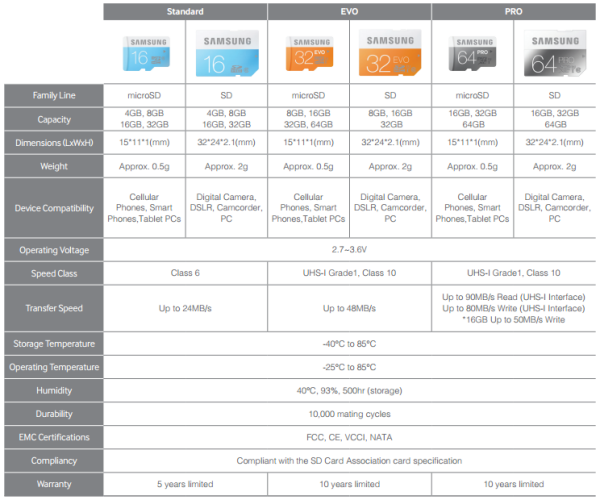
To ensure the reliability of Samsung's new memory cards, the company has designed them to be waterproof, temperature proof, X-ray proof and magnet proof, allowing them to withstand some of the harshest conditions. All three models are guaranteed to survive up to 24 hours in seawater and endure operating temperatures from -13°F to 185°F and non-operating temperatures from- 40°F to 185°F (-25°C to 85°C and -40°C to 85°C, respectively). Data in the cards will not be affected by the X-rays and can resist up to 15,000 gauss magnetic force. Additionally, the SD cards can withstand the force of a 1.9 ton vehicle.
Packaging:
Like most other memory cards, Samsung's EVO and PRO microSD cards come packaged in a cardboard blister pack. The front of the packaging advertises many of the cards' key features including capacity, class rating and rated speeds. The pictures on the front also serve a purpose as they are there to help consumers choose a card based on their intended use. In the case of Samsung's EVO and PRO microSD cards, the pictures suggest that they are ideal for smart phones and tablets.
The back of the packaging provides a bit more information regarding the features and capabilities of Samsung's EVO and PRO microSD cards. Along with the cards' UHS speed class rating, the packaging shows that they are covered by a 10 year warranty and are water, magnet, temperature and x-ray proof.
Physical Features:
One of the biggest changes Samsung made to their new line of SD and microSD cards is their appearance. Instead of boring black, they now come in bright, color-coded hues. For example, Samsung's EVO cards are colored what they call "romantic orange" while the PRO cards come in "professional silver." The cards also have large Samsung logos and clearly show the capacity, model and UHS speed class.


As you'd expect, Samsung's new microSD cards are quite small. They measure 15 x 11 x 1 mm and weigh in at about 0.5g. Nevertheless, the cards are surprisingly tough as they can survive up to 24 hours in seawater, endure up to 1500G shocks and even airport security x-ray checkpoints.
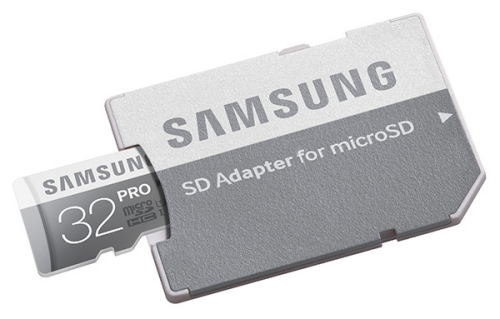
Samsung's new microSD cards are available by themselves or with either a USB 2.0 reader or an SD adapter. With the SD adapter, simply insert the microSD card into the adapter and you can use it with mobile devices as well as various SD-enabled devices such as digital cameras, laptops, printers etc. This also lets you easily transfer photos, music and video content on your microSD card from mobile devices to a PC or any device with an SD slot.
Performance:
The test system used in this review was an HP 8200 Elite. The computer is equipped with an Intel Core i5-2400 CPU, 4GB of DDR3 1333MHz memory, Seagate Barracuda 7200.12 ST3250312AS 250GB SATA 6 Gb/s hard drive, NVIDIA Quadro FX580 512MB PCIe graphics card, Intel 82567LM-3 gigabit network card, Patriot SuperSpeed USB PCIe host card and a Transcend TS-RDF5K USB 3.0 card reader. For the operating system, I installed a fresh copy of Windows 7 Enterprise.
To test the performance of Samsung's EVO and PRO microSD cards, I ran a series of benchmarks using CrystalDiskMark 3.0.1 and ATTO Disk Benchmark 2.46.
CrystalDiskMark 3.0:
First, I ran a few quick tests using CrystalDiskMark. This benchmark tool measures the performance of a storage device by testing its sequential read and write speeds as well as its random read and write speeds using blocks 512K and 4K in size.
According to Samsung, the PRO microSD card is capable of reading at 90MB/s and writing at 80MB/s. While the card performed very well when reading, it came up a bit short of its rated speed in CrystalDiskMark's sequential write test. As you'd expect, Samsung's EVO microSD card wasn't nearly as fast. Looking at the screenshot above, you can see that it was able to read at 47.24 MB/s and write at 22.37 MB/s
ATTO Disk Benchmark 2.46:
I also used ATTO Disk Benchmark to test the EVO and PRO microSD cards' sequential read and write speeds. The test was run using blocks ranging in size from 0.5KB to 8192KB and the total length set to 256MB.
When tested with ATTO, the PRO microSD card's read speeds topped out at about 90 MB/s and its write speeds at 80 MB/s. Once again, the EVO wasn't nearly as fast. This time around, it was able to read at about 47 MB/s and write at 22 MB/s.
Final Thoughts:
Samsung's EVO and PRO microSD cards are a great addition to the company's already impressive line of flash-based storage products. Ideal for digital imaging and mobile devices, these consumer friendly cards are available in a wide range of capacities and are color-coded to represent the performance level and features of each card. The Samsung's EVO and PRO microSD cards are also designed them to be waterproof, temperature proof, X-ray proof and magnet proof and are covered by a generous 10 year warranty.
The biggest difference between Samsung's EVO and PRO microSD cards is the performance. The PRO is aimed at enthusiasts and professionals and, with transfer speeds in excess of 80 MB/s, it's well suited for full HD camcorders and DSLR cameras. The EVO isn't as fast, especially when writing data. However, with a maximum read speed of more than 47 MB/s, it's a great choice for smart phones, tablets and digital cameras.
Samsung's EVO and PRO microSD cards are available now in a wide range of capacities. Prices on Amazon range from $9 (8GB) to $100 (128GB) for the EVO and $18 (16GB) to $60 (64GB) for the PRO series cards.


